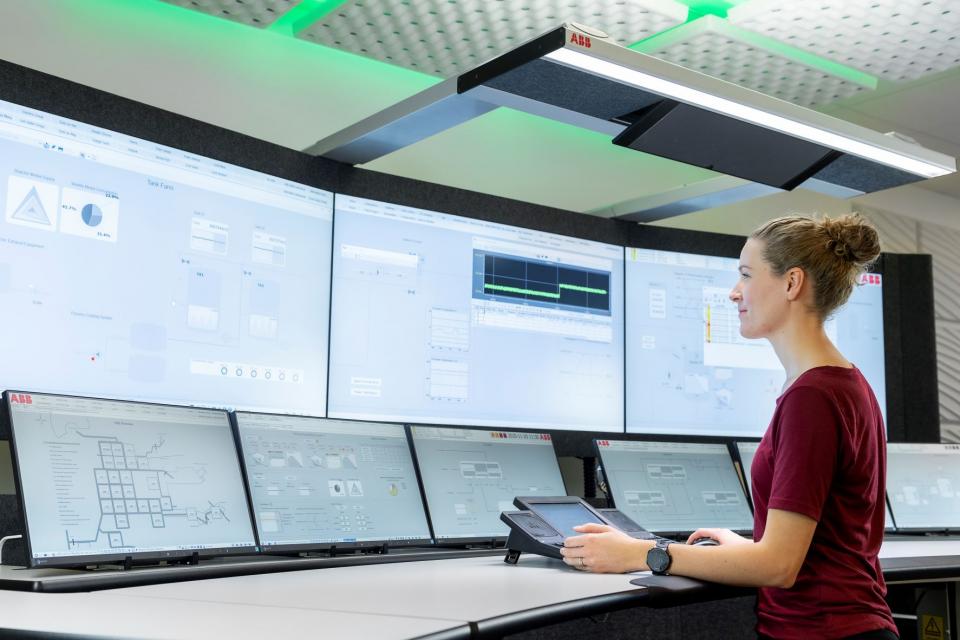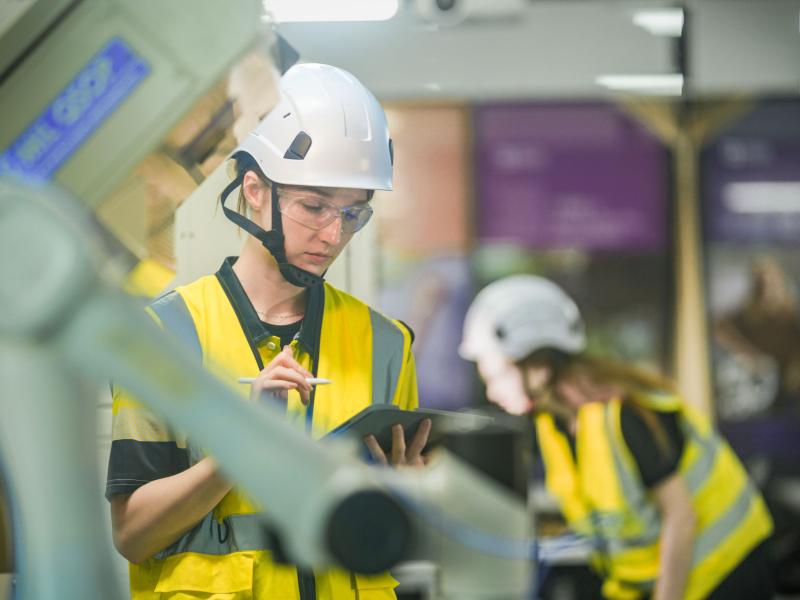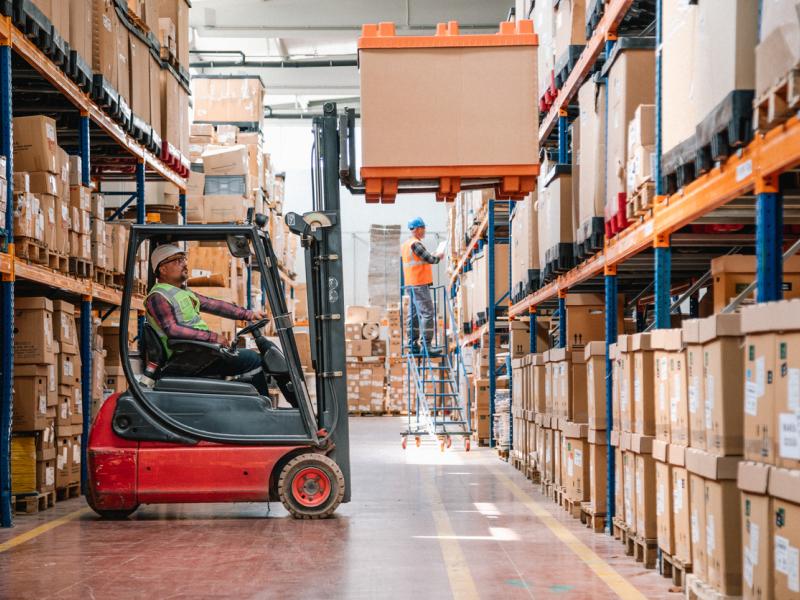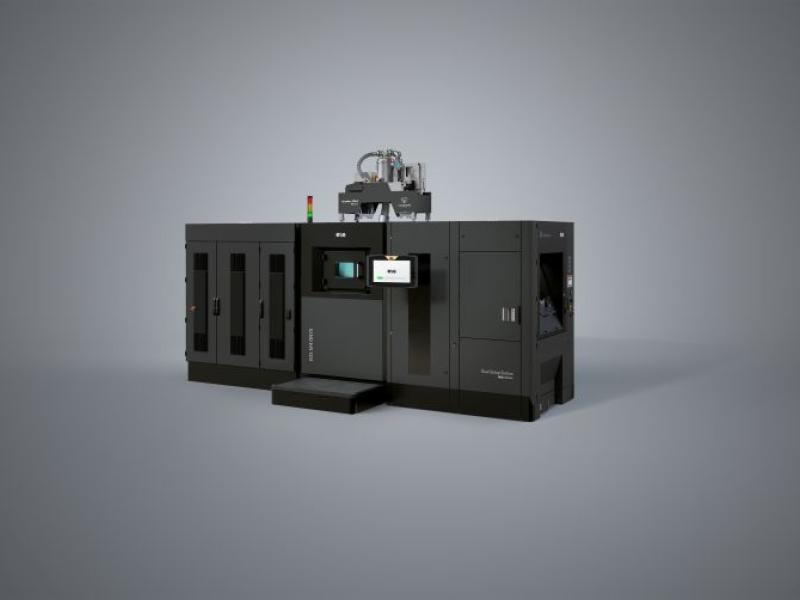What does the Distributed Control System of tomorrow look like? In a rapidly evolving industrial landscape, process automation must become smarter, safer, more agile and more energy efficient. ABB’s Johan Björklund explores how digitalisation and changing customer needs are redefining the DCS agenda.
Industrial companies have plenty of challenges to grapple with in a post-COVID world. Within a complex and rapidly evolving geopolitical landscape, traditionally robust global supply chains suddenly seem fragile. Against a backdrop of rising costs and skilled labour shortages, organisations must find efficient new business models to boost productivity while enhancing the sustainability of their operations and demonstrating a long-term commitment to decarbonisation.
An essential feature of today’s industrial process landscape, Distributed Control Systems (DCS) have been helping utilities and manufacturers to operate more safely, reliably and efficiently for over 40 years. Today, however, familiar DCS paradigms are flexing to embrace the opportunities – and demands – of digital transformation and rapidly evolving customer needs.
The last decade has witnessed unprecedented technological change. Mirroring consumers’ voracious uptake of fixed and mobile broadband services, the Industrial Internet of Things (IIOT) already represents billions of IP-enabled sensors, actuators and systems, collectively generating petabytes of information. Artificial Intelligence and Machine Learning have given us new tools to analyse these vast datasets, yielding actionable insights that can be leveraged to make operations more efficient and deliver enhanced customer experience.
Advances in cloud, edge computing and virtualisation technologies have the potential to reduce the cost and friction of digital interactions while shrinking organisations’ environmental footprints. Meanwhile, cybersecurity has become a critical conversation at board level in every industry sector. Each connected endpoint in the IIOT presents an opportunity for hackers to exploit vulnerabilities in mission-critical systems, putting corporate reputations and national economies at risk.
What does the Distributed Control System of tomorrow look like? In a rapidly evolving industrial landscape, process automation must become smarter, safer, more agile and more energy efficient. ABB’s Johan Björklund explores how digitalisation and changing customer needs are redefining the DCS agenda.
Industrial companies have plenty of challenges to grapple with in a post-COVID world. Within a complex and rapidly evolving geopolitical landscape, traditionally robust global supply chains suddenly seem fragile. Against a backdrop of rising costs and skilled labour shortages, organisations must find efficient new business models to boost productivity while enhancing the sustainability of their operations and demonstrating a long-term commitment to decarbonisation.
An essential feature of today’s industrial process landscape, Distributed Control Systems (DCS) have been helping utilities and manufacturers to operate more safely, reliably and efficiently for over 40 years. Today, however, familiar DCS paradigms are flexing to embrace the opportunities – and demands – of digital transformation and rapidly evolving customer needs.
The last decade has witnessed unprecedented technological change. Mirroring consumers’ voracious uptake of fixed and mobile broadband services, the Industrial Internet of Things (IIOT) already represents billions of IP-enabled sensors, actuators and systems, collectively generating petabytes of information. Artificial Intelligence and Machine Learning have given us new tools to analyse these vast datasets, yielding actionable insights that can be leveraged to make operations more efficient and deliver enhanced customer experience.
Advances in cloud, edge computing and virtualisation technologies have the potential to reduce the cost and friction of digital interactions while shrinking organisations’ environmental footprints. Meanwhile, cybersecurity has become a critical conversation at board level in every industry sector. Each connected endpoint in the IIOT presents an opportunity for hackers to exploit vulnerabilities in mission-critical systems, putting corporate reputations and national economies at risk.
Doing business in a changed world
At ABB we’ve also seen our process automation customers going through some big business changes. Many industries have been marked by successive waves of acquisitions and consolidation. This has led to companies having to manage a portfolio of several automation systems from different vendors, rather than just one or two solutions. In turn, this has put central support organisations under strain and driven up operating costs.
Digitalisation – and the advent of the ‘Digital DCS’ – is accompanied by a new generation of operational and management talent, whose skills and expectations are very different from those of an older workforce that’s now starting to retire from the industry. And as companies build plants in more remote parts of the world, it can be increasingly hard to find personnel with the right automation expertise.
Keeping pace with future requirements
In this volatile environment, it’s not surprising industrial users are demanding control systems that can flex to accommodate unpredictable future requirements. To do this they need DCS solutions that are reliable, open, scalable, and secure. Equally, process automation customers need the ability to incorporate new functions and workflows while protecting the value of significant legacy investments. Key to this evolved paradigm is a modular design approach, where process elements can be readily swapped out or upgraded, without the costly and time-consuming decommissioning of whole systems and their replacement with new ones.
This requirement demands expansion of DCS functions without affecting the core control system. Here the NAMUR open architecture (NOA) model provides a secure, open environment for integrating IT components from the field up to enterprise level. The takeaway for operators is an extension of the capabilities of their control systems, allowing them to incorporate functions like device management and optimisation with minimal disruption to everyday operations.
Moving non-core functions to a connected-yet-separate digital environment allows the creation of a more agile, modular environment that enables faster adoption of new offerings while existing applications can be ported to a secure virtualised environment.
Rethinking project execution
Pressures to accelerate the introduction of new production units demand DCS solutions that are quicker and easier to deploy with less reliance on specialist engineering resources. One way to realise this is by the separation of automation hardware and software engineering at the set-up stage. As an example of this approach, ABB’s Adaptive Execution platform integrates expert teams, new technologies, agile processes and shared learnings in an environment that allows multiple teams to work in parallel from remote locations.
Circumventing the time and step-dependent stages typically associated with engineering control system hardware and software, this approach can potentially realise time savings of anything up to 40 percent on a typical project.
There are other opportunities to save valuable time by using pre-made and pre-tested automation software modules. Already configured with the elements required for a particular application, they’re also equipped with the necessary interfaces to communicate with each other and with the system as a whole.
Automating or removing time-consuming tasks, tomorrow’s DCS solutions will thus accelerate project delivery while freeing up personnel to focus on high-level tasks.
Taking an analytical approach
Data is an underused by-product of many plant operations. AI-enabled analytics can be combined with edge computing to analyse this data at its point of origin, enabling improved asset management and predictive maintenance to help optimise plant utilisation and drive down operational costs. Data also plays a crucial role in supporting regulatory compliance, with developments such as cloud-hosted continuous emissions data analytics being used to check the performance of emissions monitoring systems.
Pivoting to new business models
The effective separation of hardware and software in the digital DCS offers an alternative path when it comes to upgrading to meet future challenges. Whereas specifying and purchasing hardware based DCS systems has traditionally been a protracted and costly exercise, the new digital ecosystem allows for a totally different approach to be taken, enabling changes to be made faster and at lower cost.
Already common in other industries, Software-as-a-Service (SaaS), Platform-as-a-service (PaaS) and similar pay-as-you-use business models are becoming attractive, giving DCS customers flexibility to pick and choose the applications and services they need while reducing upfront capital expenditure.
More autonomy, more intelligence
The lack of suitably skilled engineering talent presents a growing challenge for process operators. While today’s control systems have reduced the need for manual management of several low-level processes, human intervention is still essential to handle more complex tasks and make unusual decisions.
Tomorrow’s process control systems will be increasingly reliant on AI to achieve true autonomy, with the caveat that the technology must be demonstrated to be both safe and effective. ABB characterises these solutions with its own taxonomy that ranges from ‘no autonomy’ through to situations where all decision making and actions are performed completely autonomously by the system.
AI and machine learning algorithms will also help engineers diagnose and solve process problems in the field, while Augmented Reality (AR) tools will help guide them to conduct repairs or seek assistance from subject matter experts at a distant location.
Looking forward to a transformed future
The latest generation of digital technologies – coupled with initiatives such as NOA that enable the separation of core and non-critical functions mean – assure a bright future for DCS. As solutions become more open, flexible, and easier to manage, industrial operators are presented with a uniquely exciting opportunity to transform the performance and sustainability of their operations.
To find out more about ABB’s vision for the future of process automation, visit https://new.abb.com/control-systems/.
Doing business in a changed world
At ABB we’ve also seen our process automation customers going through some big business changes. Many industries have been marked by successive waves of acquisitions and consolidation. This has led to companies having to manage a portfolio of several automation systems from different vendors, rather than just one or two solutions. In turn, this has put central support organisations under strain and driven up operating costs.
Digitalisation – and the advent of the ‘Digital DCS’ – is accompanied by a new generation of operational and management talent, whose skills and expectations are very different from those of an older workforce that’s now starting to retire from the industry. And as companies build plants in more remote parts of the world, it can be increasingly hard to find personnel with the right automation expertise.
Keeping pace with future requirements
In this volatile environment, it’s not surprising industrial users are demanding control systems that can flex to accommodate unpredictable future requirements. To do this they need DCS solutions that are reliable, open, scalable, and secure. Equally, process automation customers need the ability to incorporate new functions and workflows while protecting the value of significant legacy investments. Key to this evolved paradigm is a modular design approach, where process elements can be readily swapped out or upgraded, without the costly and time-consuming decommissioning of whole systems and their replacement with new ones.
This requirement demands expansion of DCS functions without affecting the core control system. Here the NAMUR open architecture (NOA) model provides a secure, open environment for integrating IT components from the field up to enterprise level. The takeaway for operators is an extension of the capabilities of their control systems, allowing them to incorporate functions like device management and optimisation with minimal disruption to everyday operations.
Moving non-core functions to a connected-yet-separate digital environment allows the creation of a more agile, modular environment that enables faster adoption of new offerings while existing applications can be ported to a secure virtualised environment.
Rethinking project execution
Pressures to accelerate the introduction of new production units demand DCS solutions that are quicker and easier to deploy with less reliance on specialist engineering resources. One way to realise this is by the separation of automation hardware and software engineering at the set-up stage. As an example of this approach, ABB’s Adaptive Execution platform integrates expert teams, new technologies, agile processes and shared learnings in an environment that allows multiple teams to work in parallel from remote locations.
Circumventing the time and step-dependent stages typically associated with engineering control system hardware and software, this approach can potentially realise time savings of anything up to 40 percent on a typical project.
There are other opportunities to save valuable time by using pre-made and pre-tested automation software modules. Already configured with the elements required for a particular application, they’re also equipped with the necessary interfaces to communicate with each other and with the system as a whole.
Automating or removing time-consuming tasks, tomorrow’s DCS solutions will thus accelerate project delivery while freeing up personnel to focus on high-level tasks.
Taking an analytical approach
Data is an underused by-product of many plant operations. AI-enabled analytics can be combined with edge computing to analyse this data at its point of origin, enabling improved asset management and predictive maintenance to help optimise plant utilisation and drive down operational costs. Data also plays a crucial role in supporting regulatory compliance, with developments such as cloud-hosted continuous emissions data analytics being used to check the performance of emissions monitoring systems.
Pivoting to new business models
The effective separation of hardware and software in the digital DCS offers an alternative path when it comes to upgrading to meet future challenges. Whereas specifying and purchasing hardware based DCS systems has traditionally been a protracted and costly exercise, the new digital ecosystem allows for a totally different approach to be taken, enabling changes to be made faster and at lower cost.
Already common in other industries, Software-as-a-Service (SaaS), Platform-as-a-service (PaaS) and similar pay-as-you-use business models are becoming attractive, giving DCS customers flexibility to pick and choose the applications and services they need while reducing upfront capital expenditure.
More autonomy, more intelligence
The lack of suitably skilled engineering talent presents a growing challenge for process operators. While today’s control systems have reduced the need for manual management of several low-level processes, human intervention is still essential to handle more complex tasks and make unusual decisions.
Tomorrow’s process control systems will be increasingly reliant on AI to achieve true autonomy, with the caveat that the technology must be demonstrated to be both safe and effective. ABB characterises these solutions with its own taxonomy that ranges from ‘no autonomy’ through to situations where all decision making and actions are performed completely autonomously by the system.
AI and machine learning algorithms will also help engineers diagnose and solve process problems in the field, while Augmented Reality (AR) tools will help guide them to conduct repairs or seek assistance from subject matter experts at a distant location.
Looking forward to a transformed future
The latest generation of digital technologies – coupled with initiatives such as NOA that enable the separation of core and non-critical functions mean – assure a bright future for DCS. As solutions become more open, flexible, and easier to manage, industrial operators are presented with a uniquely exciting opportunity to transform the performance and sustainability of their operations.
To find out more about ABB’s vision for the future of process automation, visit https://new.abb.com/control-systems/.






